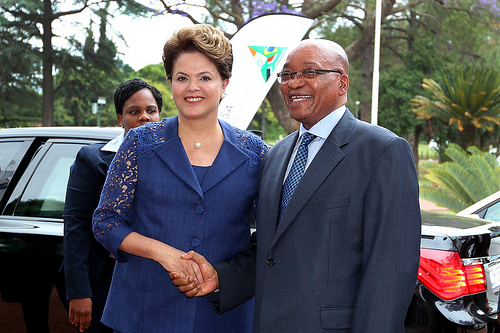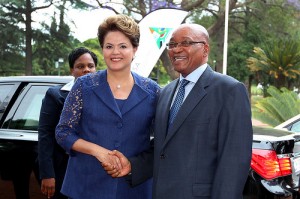
In Economic Battle for Influence, Soft Power May Decide the Winner

President Dilma Rousseff and South African president Jacob Zuma. Courtesy of Brazilian Foreign Ministry
A recent article in the Huffington Post highlights what may be a decisive factor in a battle between two rising powers in Africa: soft power. Brazil and China, in their efforts to expand their industries’ reach and secure natural resources, respectively, have developed aggressive strategies in the continent.
But China’s approach and their companies’ growing reputation for “callous and unscrupulous” business dealings and poor treatment of African employees may pose a challenge to their plans.
The two countries have different goals in the region. Brazil sees Africa as a potential export consumer market and a place where its major companies in mining, oil and construction can expand their reach. China is eyeing Africa’s natural resources, which Brazil has plenty of. In the last decade, trade between Brazil and Africa went from 4 billion to 27 billion dollars, and Brazil doubled the number of embassies there.
While China’s economic capabilities far surpass Brazil’s, cultural ties and soft power may give the South American nation an edge. Brazil’s approach to Africa has been that of South-South cooperation; government agencies and several Brazilian universities have partnered with many different countries to provide technical support and knowledge transfer ranging from the fields of biomedicine to agriculture.
Aside from historical and cultural ties, Brazil has other means of contact with Lusophone African countries through different multilateral organizations, including the Community of Portuguese Language Countries (CPLP) and the African Union, in which the country has been a guest several times.
This South-South cooperation is at the core of Brazil’s attractiveness. The country’s size and growing influence could be seen as threatening; but by evoking its past as a Portuguese colony and being the self-proclaimed leader of the global south, they are seen as a cooperative and friendly nation. Capitalizing on their tradition of multilateralism, Brazil’s image is that of a mediator with legitimacy, which is vital for cultivating soft power.
ASP’s Matthew Wallin has blogged about China’s soft power woes: the branding challenges Chinese businesses face, particularly, come with a growing list of horror stories related to not only employers’ conduct but product quality and their threats to the environment.
Cries of a new form of imperialism in Africa do not help China’s cause – the HuffPost article noted that some see the country as contributing to deindustrialization and underdevelopment, especially as it increasingly imports Chinese workers to avoid abuse complaints from African employees.
Both countries have amped up their game in international broadcasting to deal with this challenge – evidenced by an expansion of the China Central Television (CCTV) in Africa and Brazil’s launch of the International TV Brazil in 49 countries, which is not without its controversy.
Much has been said about Brazil’s soft power challenge in the upcoming years – with two major sports events putting it in the spotlight and its growing presence as an international mediator, the country needs to invest in a public diplomacy and soft power strategy that invests heavily in cultural diplomacy, keeping in mind a long-term plan.
In Africa, the same applies: Brazil’s economic success there may depend on its ability to capitalize on its attractiveness and deliver through its private companies. This is an even bigger challenge since unlike China, as a democratic nation, the Brazilian government has little if any ability to intervene with its companies.
It will nonetheless be interesting to see whether economic might or cultural ties and a soft power edge win in the long-term. Depending on the result, it could help Brazil become the world’s first big soft power power.






[…] In Economic Battle for Influence, Soft Power May Decide the Winner […]
[…] In Economic Battle for Influence, Soft Power May Decide the Winner […]